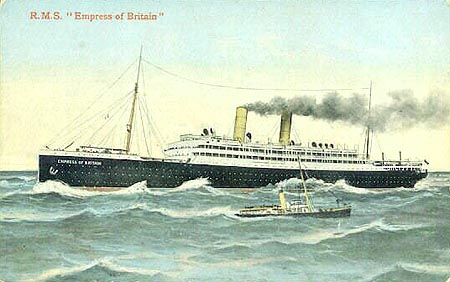|
Apr 6, 1890
|
Born in Port Hood, Nova Scotia to Ronald John
and Isabel (nee Chisolm) McDonald
|
|
Jul 27, 1915
|
Attested into the 76th Battalion in
Welland, Ontario
Ø Number 141069
Ø Next of kin given as Mr. Ronald McDonald, Port Hood, Nova Scotia
Ø Previous occupation given as Moulder
Ø Previous military experience given as 44th Regiment,
Canadian Militia
Ø Religion given as Roman Catholic
Ø Assigned to “C” Company
The battalion initially trained in the Niagara
Camp near Niagara Falls, Ontario
|
|
Nov 5, 1915
|
The battalion left the Niagara Camp and marched
to Toronto where they boarded a train and proceeded to Barrie to continue training over
the winter
|
|
Apr 23, 1916
|
Embarked the Empress of Britain in Halifax, Nova
Scotia

|
|
May 5, 1916
|
Disembarked in Liverpool, England and the
battalion proceeded to the West Sandling Camp, near Hythe, Kent for additional training
|
|
Jun 28, 1916
|
Transferred to the 21st Battalion
|
|
Jun 29, 1916
|
Arrived at the CBD (Canadian Base Depot) in the
Rouelles Camp, Havre, France and TOS (Taken On Strength) the 21st Battalion.
|
|
Sep 15, 1916
|
The 21st Battalion was in a front
line trench next to the Albert-Bapaume road preparing to launch a major attack on a German
strong point in a sugar refinery near Poziéres when, at 4.30 am, the enemy launched an
intense bombing attack. Several men of the
battalion were killed, and Private McDonald was reported missing. His body was never recovered from the battlefield
and he was later officially reported to have been killed.
Because his remains were never recovered, he is commemorated on the Canadian
National Vimy Memorial, Vimy Ridge, France

Following the war the British War Medal, Victory
Medal, Plaque (Dead Man’s Penny) and Scroll were sent to his father, R.J. McDonald,
Port Hood, Nova Scotia.
The Memorial Cross was sent to his mother, Mrs.
Isabel McDonald, at the same address
|
|

